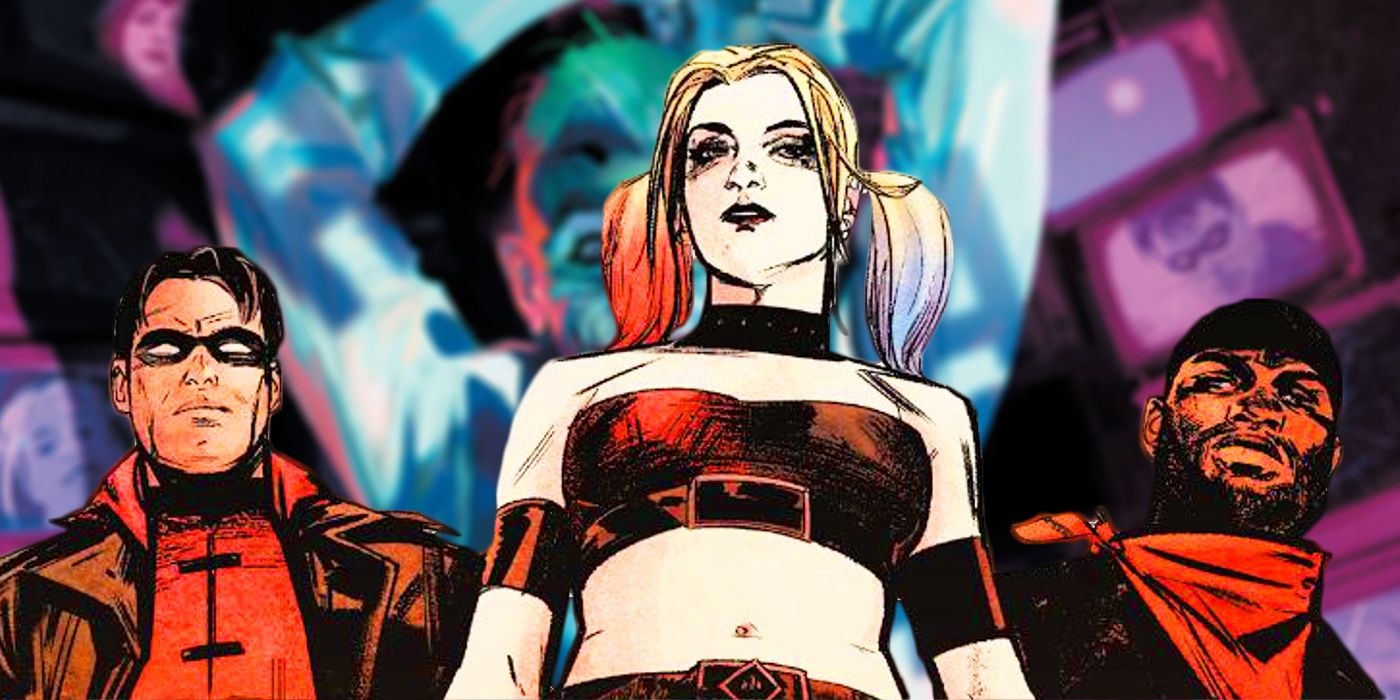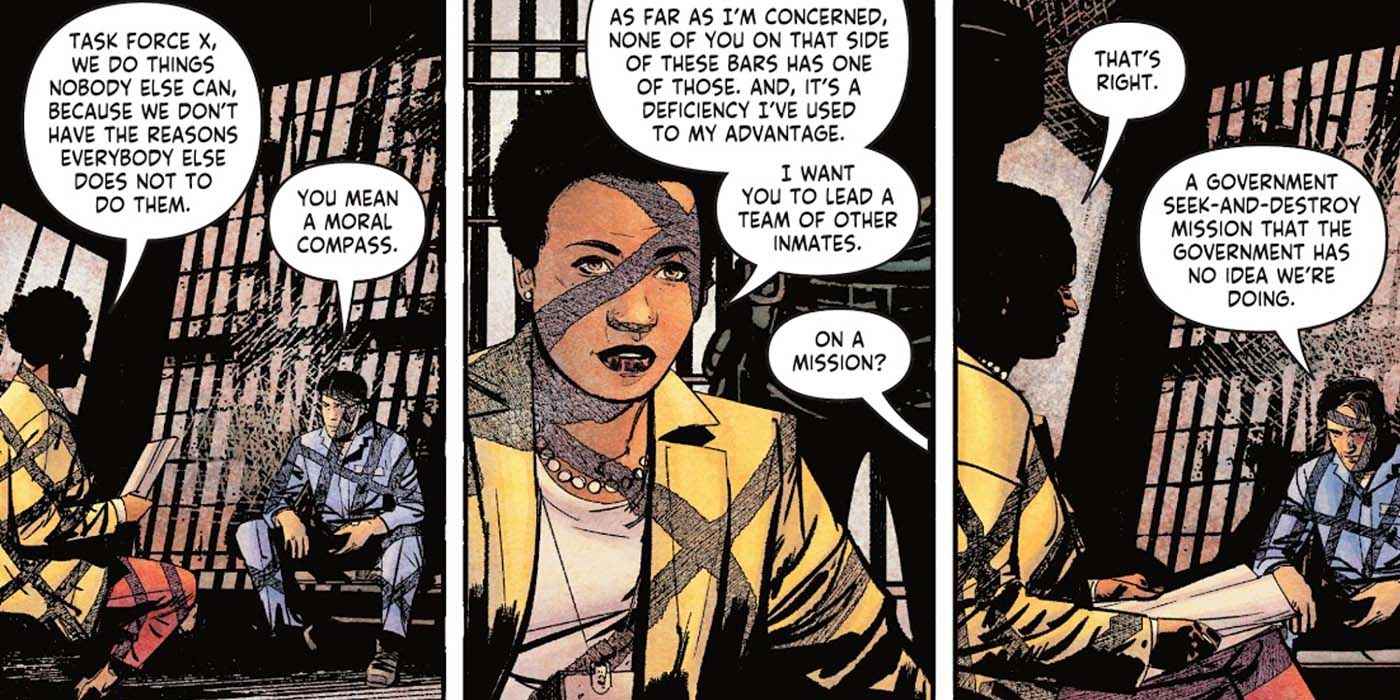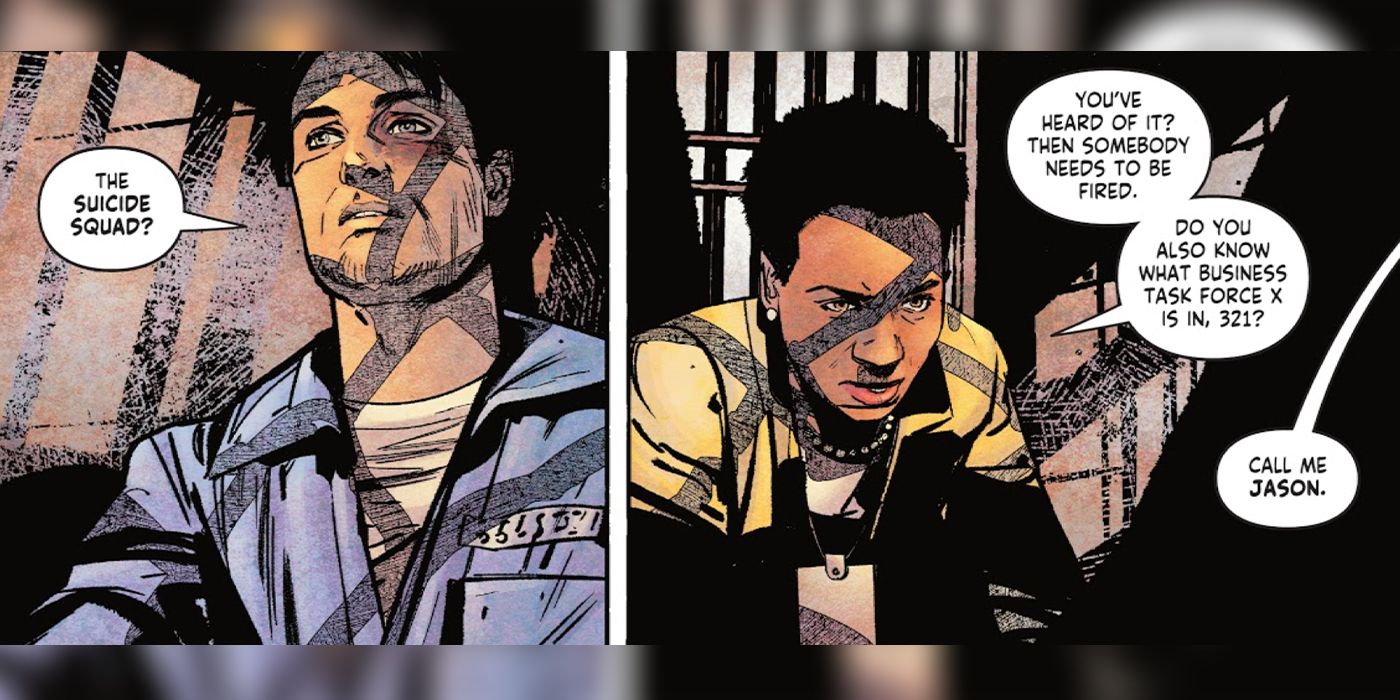Warning: spoilers for Suicide Squad: Get Joker! #2 are ahead.
It's no secret that the Suicide Squad from DC Comics is a team made for misfits, making it a natural fit for Red Hood, at least in theory. Using incarcerated villains to carry out missions that the US government would never formally admit to being involved in, the Suicide Squad represents the flip side of superhero comics. Whereas heroes are guided by their principles to preserve life, the Suicide Squad will do whatever it takes to get their prison sentences shortened. Their existence in the DC Universe evidences its dearth of idealistic heroism amidst the heroics of characters like Wonder Woman and Superman. But even with the Suicide Squad's unabashedly dodgy morals, Red Hood's reason for being on the team in Suicide Squad: Get Joker! is at odds with his foundations as a character.
In the ongoing Black Label miniseries from Brian Azzarello, Alex Maleev, Matt Hollingsworth, and Jared K. Fletcher, an incarcerated Jason Todd is recruited by Amanda Waller to lead Task Force X on a mission to kill the Joker. Jumping at the chance to not only shorten his prison sentence, but also possibly get revenge on one of his greatest enemies, Red Hood joins the team. However, as the series has gone on to its second issue, it is becoming more and more clear why Red Hood's presence on the team is a misstep.
Azzarello's Red Hood is on the Suicide Squad because of his purported lack of a moral compass, and this approach to the character is where his use on the team becomes suspect. Not having morals is a defining characteristic of the Suicide Squad, but for Red Hood, the picture is much more complex. While Red Hood's willingness to kill his enemies makes him significantly less of an idealistic figure in the DC Universe, the reason why Jason Todd became Red Hood in the first place is because he has a moral compass. Seeing that his violent murder at the hands of the Joker went unavenged by his adoptive father, Batman, it became Jason Todd's mission as Red Hood to protect innocent people in a way that The Dark Knight never could. His methods are flawed, but his intentions have always been in the right place.
By viewing Red Hood within this framework, Suicide Squad: Get Joker! trades the central tensions underlying his character for a simplistic view of morality. The result is a version of Red Hood who not only fails his teammates as a leader, but fails Jason Todd's greatest legacy as a character: emotionality. Without his intense inner life, Get Joker!'s Red Hood isn't Red Hood at all, but a reflection of a hesitancy to imagine that men like Jason Todd have feelings about the violence they've experienced.
Looking back at his publication history, Jason Todd's emotional nature has been a consistent source of trouble for him, stretching back to his days as Batman's Robin, to his rebirth as Red Hood, to time as the leader of the Outlaws, and in his latest story from Batman: Urban Legends. It drives him to make impulsive decisions that he later regrets, but on a fundamental level, proves why he has never been a coldblooded killer. While Jason Todd has done some terrible things, he has never been driven by cruelty alone, and this is a trait that differentiates him from the Joker and other villains in the DC Universe.
And this sense of emotion is precisely why Jason Todd's Red Hood is such a compelling character, because it opens doors for a level of complexity that enriches the genre as a whole. Jason's arc as a victim-turned-vigilante illustrates the emotional and psychological costs of crimefighting to a degree that almost no other character in the DC Comics can challenge him on. The fact that such a conflicted character like Red Hood is driven by his own feelings about a traumatic event in his life brings an added sense of nuance to the DC Universe and superhero comics in general.
But Get Joker! avoids delving into this complexity in order to continuously remind readers of how bad the Joker is. In issue two of the series, Red Hood watches as the Joker forces Harley Quinn to strip and dance onstage for him. He does nothing, saying that she is, "taking one for the team" even though Harley is visibly humiliated by the ordeal. Troubling implications for Harley Quinn's character aside, this betrays the entire ethos of Jason Todd's turn as Red Hood: to not stand idly by in the face of abuse and cruelty, to turn feelings of outrage into action. His failure to do anything walks back on the progress his character has made in defiance of the Joker's actions.
This scene shows why Red Hood's place on the Suicide Squad in Get Joker! is ultimately inconsistent with his character. His inaction exemplifies how he is not in the story to be Red Hood, but to be the Robin who was murdered by the Joker. More than thirty years after Batman: A Death in the Family, Jason Todd is once again relegated to being a helpless casualty, an example of how awful the Joker truly is.
Suicide Squad: Get Joker! misunderstands the genesis for Jason Todd's life as Red Hood because it focuses on the moral dimensions of his actions, rather than the emotional reasons for why they happened in the first place. And while this certainly isn't the first time that this has happened in Jason Todd's publication history, his presence on the Suicide Squad–a team of people meant to be understood as "bad"–is frustrating because of its implications. If a victim can flatly be considered "bad" for wanting to stop the violence that they experienced from happening to anyone else, then there are a lot more people in the DC Universe besides Red Hood who ought to be on Get Joker!'s Suicide Squad.
Ultimately, Jason Todd's turn as Red Hood exists in defiance of the Joker and the helplessness that he instills in his victims. And yet Red Hood is not on the Suicide Squad in Get Joker! to continue the progress his character has made to define himself on his own terms. Despite becoming one of DC Comics' most compelling characters, Suicide Squad: Get Joker! was never invested in unpacking Red Hood's complexities as much as it was in providing yet another spectacle for the Joker's cruelty.



